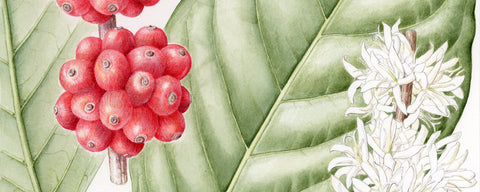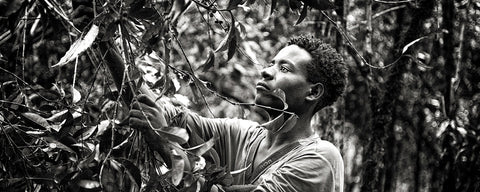First Published - February 23, 2017 (By Pascale - Coffee Lover, Traveller and Mother)
In an era of dwindling crop diversity, coffee farmers are diversifying their coffee plantations.
Once there were tens or hundreds of breeds of every fruit and veggie you can think of. Today, when I go to the supermarket in the Netherlands I find only one version of broccoli, corn or carrot. Modern production has streamlined our choices. Nature depends upon diversity to thrive, and consumers miss out on all the flavours (sweet, delicate, floral, nutty) that nature designed.
Apples are a different story, many groceries will offer different varieties of apples each for one’ s taste, mood or use (pie baking versus snacking).
Granny Smith: Crunchy and tart
Golden Delicious: Crisp and sweet
Fuji: Crunchy and super sweet
We can all relate to this, and probably have our favourite apple. But what about coffee, have you ever thought about coffee in such a way?
The genus coffea, has about 100 species, only a few of which are commercially relevant: Arabica, Canephora (var. Robusta) and Liberica. The species Arabica is grown for speciality coffee and makes up approximately 70% of the world’s coffee production. Coffee varieties are the diverse subspecies derived through selective breeding or natural selection of coffee plants, and there is a tremendous variety! So within Coffea Arabica there is a wide diversity of varieties (or cultivars). A variety retains most of the characteristics of the species, but differs in some ways. For coffee growers, these mostly relate to the ‘technical aspects’ of coffee growing. The size of the tree, planting density, yields, susceptibility to disease and so forth. The decision of what varietal to plant, might be one of the most important decisions in growing coffee. On average, the life of a coffee tree is 20-30 years. It takes three to four years for a tree to become productive, if a farmer makes a poor decision on variety, the cumulative loss can be huge. Losses to pest and disease can be huge for farmers, whipping out crops leaving farmers with little or no income left.
Therefore, in the past coffee breeders took two factors into account
- Yields (the higher the better)
- Disease resistance.
Cup quality, wasn’t an important factor in breeding.
In the 1920s, a C. arabica and a C. robusta plant on the island of East Timor reproduced to create a new coffee now known as the Timor Hybrid. Robusta obtained its name, because of its Robust characteristics, amongst other coffee leaf rust resistance. This varietal was used to create new cultivars, breeding it with Caturra (Catistic, Costa Rica 95, Oro Azteca) or Villasarchi. Coffee varieties with high yields, disease resistance but less quality potential at higher altitudes]. In countries, such as El Salvador farmers started replacing traditional (susceptible) varieties such as Pacas, Pacamara and Bourbon for Catisic. National programmes promoted these varieties, traditional varieties started to disappear from the coffee landscape.
The rise of Speciality Coffee, and the increased demand in unique flavours has caused a new trend amongst speciality coffee growers. Farmers like Graciano Cruz, illustrate a diversity success story still unfolding, coffee growers revive heirlooms traditionally grown but forgotten or replaced by more productive varieties.
Buyers like Union Coffee are willing to pay on the basis of cup quality and not the whims of the market. Farmers are taking the risk, of planting forgotten or more difficult to grow varieties. These varieties often require more care, have lower yields and there is always the risk of the plant not adapting well if taken outside of its natural habitat and grown in a new environment.
Nowadays, researchers and breeders have started focusing more on quality as an important aspect of breeding. WCR, recently published its variety intelligence report, a variety catalogue for Central America. Union Hand-Roasted supports the work of WCR, by a yearly contribution. In Yayu, we are working with Kew Botanical Gardens to preserve the Yayu forest and its rich varietal diversity within.
Farmers like Graciano Cruz are reviving rare and unique varieties such as Geisha, Pacamara or Isla Reunion (Laurina), or growing varieties known to bear a high cup quality but grown on other continents such as Kenya (SL-28) and they are now available in the UK!
YOU CAN BUY THEM HERE, BUT HURRY THEY’RE LIKELY TO SELL OUT FAST!






